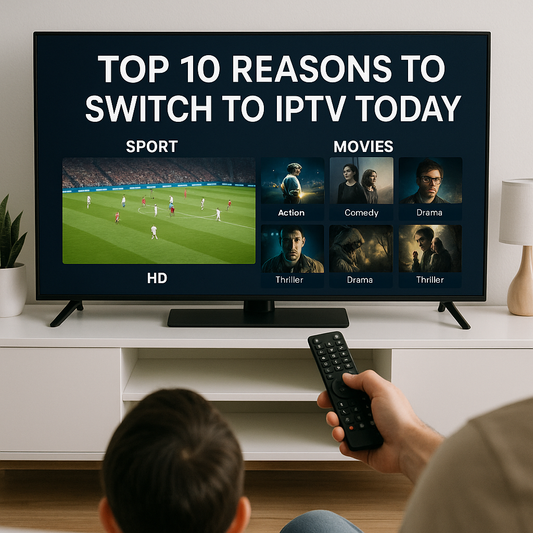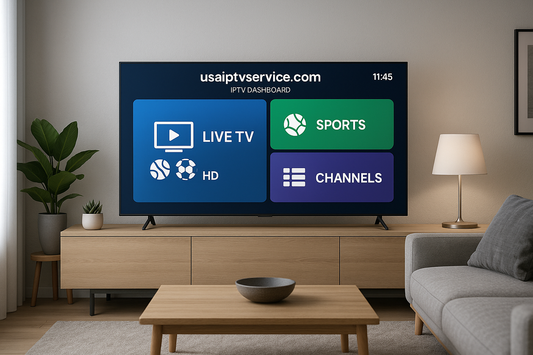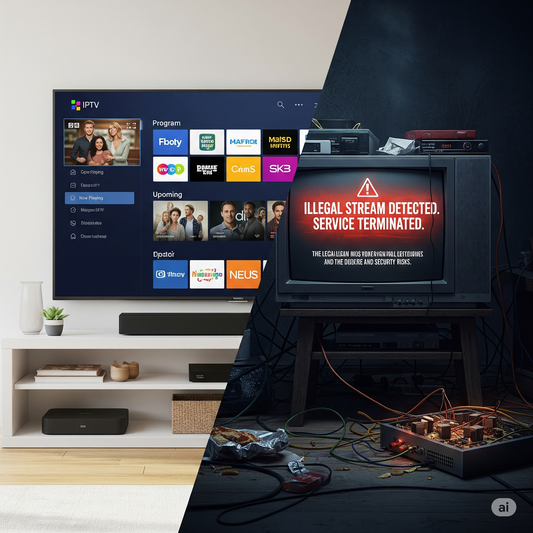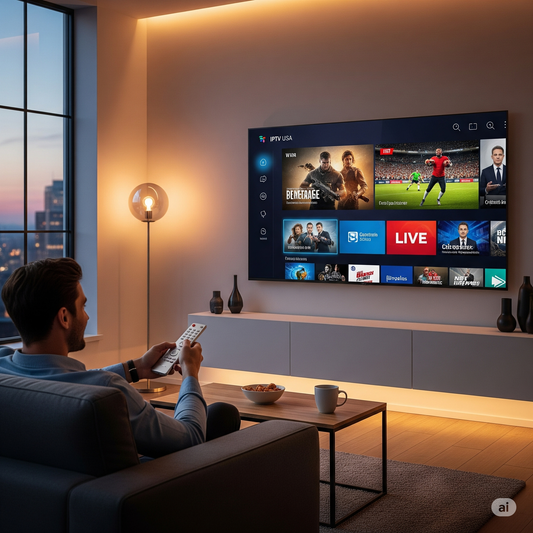Is there anything more frustrating than settling in for a movie night, only for your screen to freeze at the most critical moment? That dreaded buffering wheel can ruin any viewing experience. If you're using an IPTV service in the USA, the quality of your stream is directly tied to one crucial factor: your internet connection. But figuring out the necessary IPTV USA internet speed can feel like a guessing game. Are you paying for more speed than you need, or is your current plan the secret cause of your streaming woes?
Don't worry, we're here to clear up the confusion. This guide will provide a definitive answer to how much internet speed you *really* need for a smooth, buffer-free IPTV experience. We'll break down the requirements for every streaming quality, from Standard Definition (SD) to glorious 4K Ultra HD. By the end of this article, you'll be able to confidently choose the right internet plan and optimize your setup for flawless streaming.
What Internet Speed Do You Need for IPTV USA?
For a smooth IPTV USA experience, a minimum internet speed of 15-25 Mbps is recommended for HD streaming. For 4K Ultra HD content, you should aim for a stable connection of 50 Mbps or higher to prevent buffering and ensure the highest quality playback without interruptions.
Table of Contents
- Why Your Internet Speed is the Backbone of IPTV
- Understanding the Language: Mbps, Bandwidth, and Latency
- Recommended Internet Speeds for IPTV Streaming Quality
- Beyond Raw Speed: Other Factors That Impact Your Stream
- How to Accurately Test Your Internet Speed for IPTV
- Actionable Tips to Improve Your IPTV Streaming Quality
- Choosing the Best Internet Plan for Your IPTV Needs
Why Your Internet Speed is the Backbone of IPTV
Internet Protocol Television (IPTV) works by delivering television content over the internet, rather than through traditional satellite or cable formats. Think of it like a highway. The video and audio data are the cars, and your internet connection is the highway itself. If the highway is too narrow or congested (i.e., your internet speed is too slow), traffic jams up. For IPTV, that traffic jam results in:
- Buffering: The stream pauses to download more data.
- Low Resolution: The service may automatically downgrade your video quality to keep playing.
- Freezing or Stuttering: The video and audio lose sync or stop completely.
A stable and adequate IPTV USA internet speed ensures that the data "cars" can travel from the server to your screen without any delays, giving you a seamless and high-quality picture. It's the single most important technical requirement for cutting the cord effectively.
Understanding the Language: Mbps, Bandwidth, and Latency
When internet service providers (ISPs) talk about speed, they use terms that can be confusing. Let's demystify the three most important ones for IPTV users.
Megabits per second (Mbps)
This is the standard measurement for internet speed. It tells you how much data can be downloaded (download speed) or uploaded (upload speed) in one second. For IPTV, download speed is the most critical number, as you are constantly downloading video data from a server. A higher Mbps means you can download more data faster.
Bandwidth
Bandwidth refers to the maximum capacity of your internet connection. It's the total width of your data highway. If you have multiple devices using the internet at the same time in your home—someone gaming online, another person on a video call, and you watching IPTV—they all share this bandwidth. This is why a household with many users needs a higher speed plan than a household with just one.
Latency (or Ping)
Latency is the delay it takes for data to travel from its source to you. It's measured in milliseconds (ms). While high speed (Mbps) is crucial, high latency can also cause issues, creating a lag between you and the server. For streaming, you want low latency, but it's generally less of a concern than for online gaming. A good connection should have a ping under 100ms. According to the Federal Communications Commission (FCC), latency is a key factor in the quality of your online experience.
Recommended Internet Speeds for IPTV Streaming Quality
So, what's the magic number? It depends entirely on the resolution you want to watch. Higher quality video contains more data, so it requires a faster connection to stream smoothly.
Here is a simple breakdown of the minimum recommended internet speeds for IPTV in the USA. Remember, these are the speeds required *per stream*. If multiple people will be watching on different devices, you need to add these requirements together.
| Streaming Quality | Minimum Recommended Speed | Best Experience Speed |
|---|---|---|
| Standard Definition (SD - 480p) | 5 Mbps | 10 Mbps |
| High Definition (HD - 720p/1080p) | 15 Mbps | 25 Mbps |
| Ultra HD (4K - 2160p) | 30 Mbps | 50+ Mbps |
The Golden Rule: For the vast majority of users streaming in HD, a consistent 25 Mbps download speed is the sweet spot. This provides enough of a buffer to handle minor fluctuations and ensures other devices in your home don't interrupt your show. If you are a 4K enthusiast, investing in a 50-100 Mbps plan is highly recommended.
Beyond Raw Speed: Other Factors That Impact Your Stream
Having a high-speed internet plan is only part of the equation. Several other factors can create bottlenecks and lead to poor IPTV performance, even if you're paying for top-tier internet.
1. Wi-Fi vs. Ethernet
While Wi-Fi is convenient, it's susceptible to interference from walls, other electronic devices, and distance from the router. A wired Ethernet connection is always superior for streaming. It provides a direct, stable link from your router to your streaming device (Smart TV, IPTV box, etc.), minimizing speed loss and latency.
2. Your Router's Age and Quality
An old or underpowered router can't handle modern internet speeds. If you have a 200 Mbps plan but your router is five years old, it might be the reason you're only getting 50 Mbps on your TV. Consider upgrading to a modern router (Wi-Fi 6 or newer) for better performance and coverage.
3. Household Bandwidth Usage
As mentioned earlier, you share your bandwidth with everyone and everything connected to your network. If your kids are downloading a huge video game while you're trying to watch the evening news on IPTV, you're going to have a bad time. Always account for simultaneous usage when choosing an internet plan.
4. Throttling by Your ISP
Some Internet Service Providers may "throttle" or slow down your connection if they detect high data usage from streaming services. This is often hidden in the fine print. While difficult to prove, if you consistently notice speed drops at certain times of day, this could be the culprit. A VPN can sometimes help bypass this.
How to Accurately Test Your Internet Speed for IPTV
Don't just trust the speed advertised by your ISP. You need to test the actual speed reaching your streaming device. Running a speed test on your phone or laptop is a good start, but it's not the full picture.
Many Smart TVs and streaming boxes have built-in web browsers or app stores where you can find speed test applications. Popular and reliable options include Speedtest by Ookla and Fast.com (powered by Netflix). For the most accurate results, as detailed by tech experts at TechRadar, you should:
- Test on the IPTV Device: Run the test directly on the device you use for streaming.
- Test at Different Times: Check your speed during peak hours (like evenings) and off-peak hours to see how it fluctuates.
- Close Other Apps: Make sure no other applications are running in the background on the device.
This will give you a real-world measurement of the IPTV USA internet speed you are actually receiving.
Actionable Tips to Improve Your IPTV Streaming Quality
If your speed test results are lower than expected or you're still experiencing buffering, try these optimization steps before upgrading your internet plan:
- Switch to a Wired Connection: This is the #1 fix. Run an Ethernet cable from your router directly to your streaming device.
- Move Your Router: If you must use Wi-Fi, place your router in a central, elevated location away from walls and other electronics.
- Update Your Devices: Ensure your router's firmware and your streaming device's software are fully updated.
- Limit Other Devices: Disconnect devices that aren't in use from your Wi-Fi to free up bandwidth.
- Reboot Your Hardware: Sometimes a simple restart of your modem, router, and streaming device can solve connection issues. If you need help, check out our comprehensive setup guide for step-by-step instructions.
Choosing the Best Internet Plan for Your IPTV Needs
Now that you're armed with all this knowledge, choosing an internet plan is simple. Analyze your household's needs:
- For Solo Viewers & HD Streaming: A 25-50 Mbps plan is likely sufficient.
- For Families & Multiple Streams: A 100-300 Mbps plan provides a comfortable buffer for everyone.
- For 4K Enthusiasts & Power Users: A 300-500+ Mbps plan will ensure flawless 4K streaming, even with other high-demand activities running simultaneously.
When comparing providers, focus on download speed and look for plans with no data caps, as IPTV streaming can consume a significant amount of data over a month.
Your Perfect Stream Awaits
Understanding your IPTV USA internet speed requirements is the key to unlocking a world of buffer-free entertainment. By ensuring you have a stable connection of at least 25 Mbps for HD or 50 Mbps for 4K, and by optimizing your home network with a wired connection, you can say goodbye to frustration and hello to flawless streaming. Don't let a slow connection dictate your viewing experience.
Ready to experience the best in IPTV? With the right internet speed, our service delivers unparalleled quality and reliability. Explore our premium IPTV plans today and find the perfect package to match your streaming ambitions!






